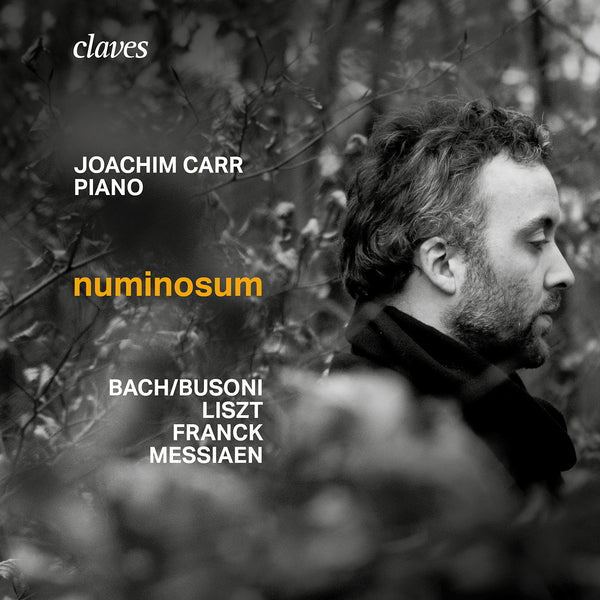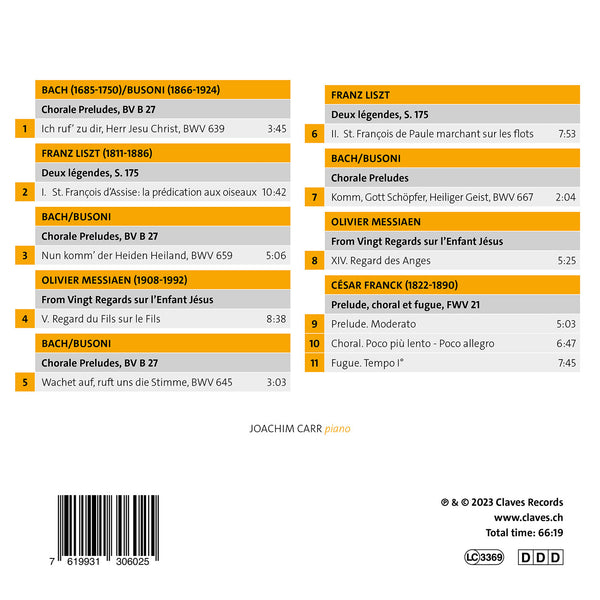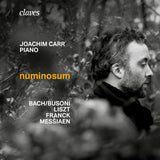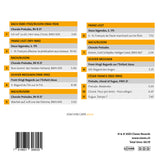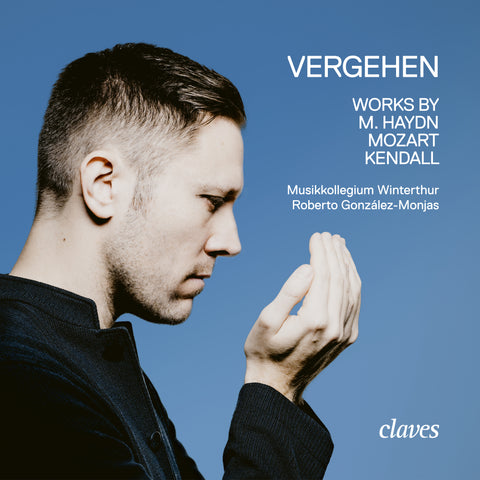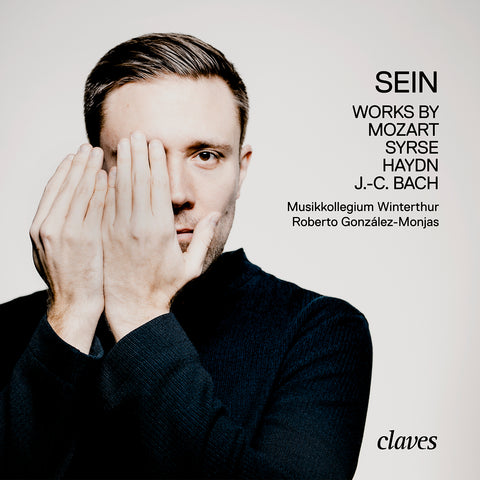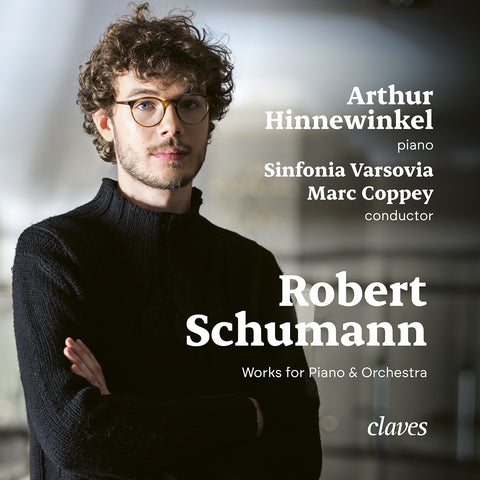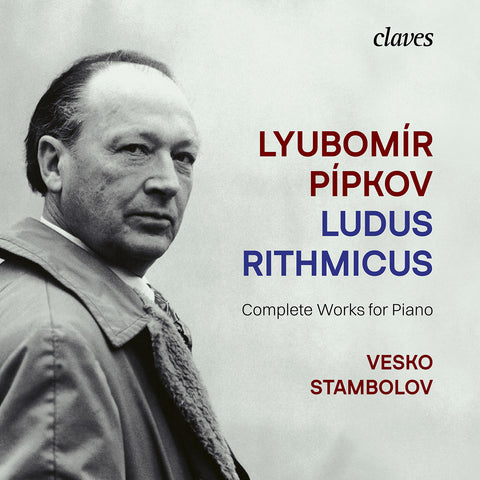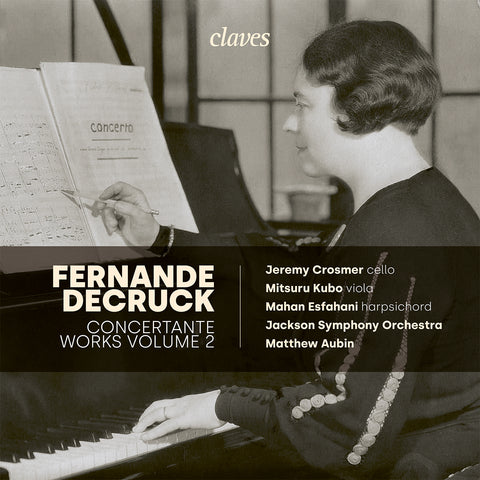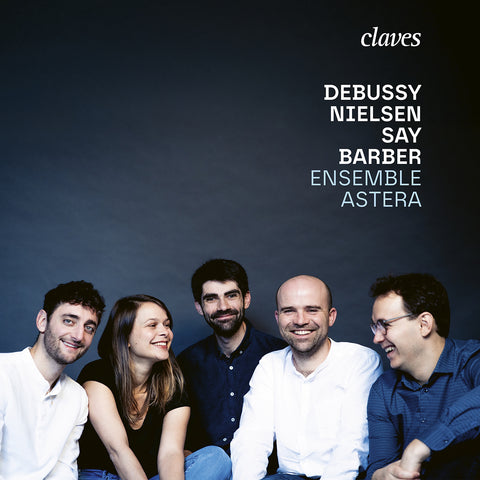(2023) Numinosum: Works by Bach-Busoni, Liszt, Franck & Messiaen
Category(ies): Piano
Instrument(s): Piano
Main Composer: Various composers (see collections)
CD set: 1
Catalog N°:
CD 3060
Release: 07.07.2023
EAN/UPC: 7619931306025
This album is now on repressing. Pre-order it at a special price now.
CHF 18.50
This album is no longer available on CD.
This album has not been released yet. Pre-order it from now.
CHF 18.50
This album is no longer available on CD.
CHF 18.50
VAT included for Switzerland & UE
Free shipping
This album is no longer available on CD.
VAT included for Switzerland & UE
Free shipping
This album is now on repressing. Pre-order it at a special price now.
CHF 18.50
This album is no longer available on CD.
This album has not been released yet.
Pre-order it at a special price now.
CHF 18.50
This album is no longer available on CD.
CHF 18.50
This album is no longer available on CD.
NUMINOSUM: WORKS BY BACH-BUSONI, LISZT, FRANCK & MESSIAEN
Numinosum
It is important to have a secret, a premonition of things unknown. It fills life with something impersonal, a numinosum. - C. G. Jung, Memories, Dreams, Reflections
This album features works by composers for whom the conception and creation of music was intimately bound up with a religious attitude towards the world. Before the birth of aesthetics in the 18th century, the symbolic or “external” meanings of music resided in the music itself; neither its expressiveness nor its purpose as an integral part of social and religious rituals were separated from a larger context of moral and spiritual considerations. In this sense, although their tonal languages and forms differ greatly, later composers such as Liszt, Franck and Messiaen followed the spirit of Bach, reflecting a musical philosophy in which musical means and theological ends were deeply intertwined, if not one and the same.
What impact does a greater awareness of the symbolic realities of religious thought, which inspired the music in the first place, have on how we — the interpreter and the listener — hear the music, and what meanings we find within it? In the accompanying essay on the following pages, I offer some observations about the program and about art more generally from a philosophical and metaphysical perspective. I propose that the experience of art — which, like the religious experience, is an encounter with the world and the inexplicable — has the potential of challenging the boundaries between self and other.
In those instances where the pull towards something other is of such magnitude that it renders the self utterly powerless and will-less, we are in the presence of the numinosum. The numinous quality resides in the phenomenon itself and is a dynamic force that takes hold of and acts upon the subject. The word derives from the Latin numen, meaning ‘divine power’ or ‘spirit’, and was coined by Rudolf Otto in his book Das Heilige, which explores the non-rational elements underpinning personal belief, and the role that spontaneous, immediate experiences play in this respect. In its adjective form, the numinous evokes the words luminous and ominous; it hints at both emanating light and at the overwhelming sense of the unknown.
The recording of the album took place in the winter of 2020 in a church on the remote Lofoten Islands in Northern Norway. During the so-called mørketid — literally “dark-time” or dark season — the light which illuminates the skies from below the horizon for only a few hours a day holds a greater meaning. This atmosphere was, I believe, very appropriate to this particular music, and certainly had an impact on the sessions. In the North, the sense that light acquires its significance from its absence or negation is more visceral. If darkness is the great unknown, something without properties and beyond measurement, its meta-physical presence is often what inspires the more immediate qualities of experience. And as illumination stands forth in contrast with the obscure, it is also within the unknown that possibility and becoming lie.
Joachim Carr
Joachim Carr
The Norwegian pianist Joachim Carr has over the past few years established himself as one of the most exciting musicians to emerge from Scandinavia.
He is the winner of several international prizes, including the First Prize, the Audience Award as well as the Orchestra Prize of the Bergen Philharmonic at the 14th International Edvard Grieg Piano Competition in 2014. The previous year, he had received the coup de coeur Prize for his recital at the 25th Concours Clara Haskil. Following his debut recital at the Oslo University Aula in 2015 – a long- standing tradition in Norwegian musical life – he received the Robert Levin Prize. For several years, he has also been a recipient of the Norwegian Government Grant for Artists.
A versatile chamber musician, he won several prizes in duo and trio formations, most notably the First Prizes at the 10th Concours International de Musique de Chambre de Lyon and at the Boris Pergamenschikow Prize for contemporary chamber music in Berlin. His chamber music partners have included Antje Weithaas, Radovan Vlatkovic, Lars Anders Tomter, Bruno Philippe, Hayoung Choi, Ingrid Fliter, Bertrand Chamayou and the Doric String Quartet.
As a recitalist and in various chamber music formations he has performed at the Klavierfestival Ruhr, Zermatt Festival, Bergen International Festival, Lofoten Piano Festival, Rosendal Chamber Music Festival, Bach Festival Moscow, PODIUM Festival Esslingen, Festspiele Mecklenburg-Vorpommern and Salzburger Kammermusikfestival.
With concerto repertoire, he has appeared with the Royal Stockholm Philharmonic, the Lithuanian State Symphony Orchestra, the Trondheim Symphony Orchestra, the Arctic Philharmonic and the Norwegian Radio Orchestra, collaborating with conductors such as Alexander Vedernikov, Gintaras Rinkevicius, Miguel Harth-Bedoya, Arvid Engegård, Eivind Aadland and Bjarte Engeset. At the closing concert of the Bergen International Festival in 2017, he had the honour of performing the Grieg Concerto with the Bergen Philharmonic under John Storgårds.
Born 1988 in Bergen, Carr received important musical impulses in his youth from pianists Jan Henrik Kayser, Håvard Gimse and Leif Ove Andsnes. After studies at the Barratt Due Institute of Music in Oslo with Czech pedagogue Jiri Hlinka, he moved to Berlin and continued his postgraduate studies with Eldar Nebolsin at the Hochschule für Musik “Hanns Eisler”. In later years he has received invaluable advice from Ferenc Rados and Rita Wagner.
His debut album for Claves Records, released in 2014, and featuring early works by Schumann, Brahms and Berg was highly praised by critics, receiving the 5 Diapason accolade by the French magazine. He has since recorded for Naxos (works by Liszt and Halfdan Cleve); and for Avi- music (Live Recordings, Klavierfestival Ruhr).
Apart from performing the classical repertoire, with a special emphasis on the Romantic and early 20th century epochs, he is committed to including his own improvisations into concert programs. He regularly cooperates with jazz and folk musicians, and is also a member of the Glorvigen Tango Quartet.
On the sensory and metaphysical realities of music
An essay in three parts (ENG) by Joachim Carr
REVIEWS
« La couleur sonore, ce gris perle avec nuages que Busoni a inventé dans son piano pour y faire entrer l’orgue intime de Ich ru zu dir, Herr Jesu Christ par lequel Joachim Carr ouvre ce qui semble son second disque solo est la même que celle choisie par César Franck, cet autre organiste, pour Prélude, Choral et Fugue qui referme l’album. Un cercle parfait, de la mystique de clavier pur, dont les deux Légendes de Liszt seront les ancrages romantiques, récits sacrés beaux comme des Piero della Francesca que le jeune pianiste norvégien joue large et profond, les gorgeant de timbres plus que d’effets. [..] Et Franck ? Sans traîner, en clavier immatériel, dans une lumière irréelle, vous entendrez le Prélude, Choral et Fugue différemment, si fluide, si serein, si détaché, reflet sonore des séances d’enregistrement sises dans une église sur une île perdue au nord de la Norvège, lorsque le soleil n’y paraît quasiment pas, avec pour seule lumière dans la ténèbre cet admirable Steinway dont j’aurais bien voulu connaître ne serait-ce que le numéro. » - Jean-Charles Hoffelé, août 2023
"A neal idea to have a programme that explores how composers across the ages expressed their religious philosophy through music. The variety works well, and Carr conjures an admirable sense of awe and reflexion. [..]" - JP, August 2023
"[..] Prélude, choral et fugue ne cherche pas à imiter les registrations de l’orgue. À la fois coulant et tourmenté, le triptyque semble tout entier tourné vers la transfiguration finale, mue par une irrépressible poussée anagogique. Et quelle sonorité !" - Jérémie Bigori, octobre 2023
“The latest Claves release from Joachim Carr is titled ‘Numinosum’, a word drawn from Jungian psychology to describe a sort of involuntary mystical or religious experience. The programme suggests that the 35-year-old Norwegian pianist is a musician with a strong spiritual bent and his booklet essay of no fewer than 17 pages seems to indicate that this spirituality flourishes within a rigorous intellectual framework. Busoni’s transcriptions of four Bach chorale preludes serve as headings to chapters variously consisting of Liszt, Franck and Messiaen. [..] This is an unusually thoughtful recording which will doubtless reward repeated listening.” - Patrick Rucker, November 2023
"Le jeune pianiste Joachim Carr a enregistré Numinosum, son deuxième album soliste, dans une église tout au nord de la Norvège. [..] Prenez Joachim Carr, un jeune pianiste qui commence à se frayer un joli chemin et s’assurer une certaine notoriété sur la scène scandinave. Mettez-le dans une église tout au nord de la Norvège, pendant l’hiver, lorsqu’il n’y a que quelques heures de crépuscule pour toute lumière dans une journée. Voilà les conditions dans lesquelles il a décidé d’enregistrer ce Numinosum, son deuxième album soliste sorti chez Claves. Il y explore le divin immanent à la musique, la recherche intérieure de contact avec la lumière du sublime, et la sublimatio et alienatio mystiques qui en dérivent quand cela se produit. [..] Carr réussit un petit miracle d’interprétation, en les magnifiant par un son perlé, léger, liquide et puissamment évocateur, tantôt intime et évanescent, tantôt assertif." - Gianluigi Bocelli, février 2024
"[..] So Carr, who on this beautifully recorded CD has filled a mixed programme that from beginning to end is a fascinating exploration of music that sounds familiar to most of us, but has been given a distinctly individualistic character by this Norwegian pianist. And I am not so much referring to the richness of sound that he manages to conjure out of the perfectly intoned and tuned Steinway D, but more to the equally rich detail in articulation, phrasing and voicing, the minuscule accelerations and decelerations masterfully applied with which he further infuses this music with the elixir of life. No less impressive is the way he builds up these pieces, giving the architectural an important role in these mostly miniatures. Then there is Carr's eminent touch and tonal shaping, as is already promptly evident in the very beginning of this fabulous recital, Busoni's arrangement of Bach's chorale prelude 'Ich ruf' zu dir, Herr Jesu Christ': the unrolled carpet of sound soon develops into a breathtaking beauty. [..]" - Aart van der Wal, June 2023
(2023) Numinosum: Works by Bach-Busoni, Liszt, Franck & Messiaen - CD 3060
Numinosum
It is important to have a secret, a premonition of things unknown. It fills life with something impersonal, a numinosum. - C. G. Jung, Memories, Dreams, Reflections
This album features works by composers for whom the conception and creation of music was intimately bound up with a religious attitude towards the world. Before the birth of aesthetics in the 18th century, the symbolic or “external” meanings of music resided in the music itself; neither its expressiveness nor its purpose as an integral part of social and religious rituals were separated from a larger context of moral and spiritual considerations. In this sense, although their tonal languages and forms differ greatly, later composers such as Liszt, Franck and Messiaen followed the spirit of Bach, reflecting a musical philosophy in which musical means and theological ends were deeply intertwined, if not one and the same.
What impact does a greater awareness of the symbolic realities of religious thought, which inspired the music in the first place, have on how we — the interpreter and the listener — hear the music, and what meanings we find within it? In the accompanying essay on the following pages, I offer some observations about the program and about art more generally from a philosophical and metaphysical perspective. I propose that the experience of art — which, like the religious experience, is an encounter with the world and the inexplicable — has the potential of challenging the boundaries between self and other.
In those instances where the pull towards something other is of such magnitude that it renders the self utterly powerless and will-less, we are in the presence of the numinosum. The numinous quality resides in the phenomenon itself and is a dynamic force that takes hold of and acts upon the subject. The word derives from the Latin numen, meaning ‘divine power’ or ‘spirit’, and was coined by Rudolf Otto in his book Das Heilige, which explores the non-rational elements underpinning personal belief, and the role that spontaneous, immediate experiences play in this respect. In its adjective form, the numinous evokes the words luminous and ominous; it hints at both emanating light and at the overwhelming sense of the unknown.
The recording of the album took place in the winter of 2020 in a church on the remote Lofoten Islands in Northern Norway. During the so-called mørketid — literally “dark-time” or dark season — the light which illuminates the skies from below the horizon for only a few hours a day holds a greater meaning. This atmosphere was, I believe, very appropriate to this particular music, and certainly had an impact on the sessions. In the North, the sense that light acquires its significance from its absence or negation is more visceral. If darkness is the great unknown, something without properties and beyond measurement, its meta-physical presence is often what inspires the more immediate qualities of experience. And as illumination stands forth in contrast with the obscure, it is also within the unknown that possibility and becoming lie.
Joachim Carr
Joachim Carr
The Norwegian pianist Joachim Carr has over the past few years established himself as one of the most exciting musicians to emerge from Scandinavia.
He is the winner of several international prizes, including the First Prize, the Audience Award as well as the Orchestra Prize of the Bergen Philharmonic at the 14th International Edvard Grieg Piano Competition in 2014. The previous year, he had received the coup de coeur Prize for his recital at the 25th Concours Clara Haskil. Following his debut recital at the Oslo University Aula in 2015 – a long- standing tradition in Norwegian musical life – he received the Robert Levin Prize. For several years, he has also been a recipient of the Norwegian Government Grant for Artists.
A versatile chamber musician, he won several prizes in duo and trio formations, most notably the First Prizes at the 10th Concours International de Musique de Chambre de Lyon and at the Boris Pergamenschikow Prize for contemporary chamber music in Berlin. His chamber music partners have included Antje Weithaas, Radovan Vlatkovic, Lars Anders Tomter, Bruno Philippe, Hayoung Choi, Ingrid Fliter, Bertrand Chamayou and the Doric String Quartet.
As a recitalist and in various chamber music formations he has performed at the Klavierfestival Ruhr, Zermatt Festival, Bergen International Festival, Lofoten Piano Festival, Rosendal Chamber Music Festival, Bach Festival Moscow, PODIUM Festival Esslingen, Festspiele Mecklenburg-Vorpommern and Salzburger Kammermusikfestival.
With concerto repertoire, he has appeared with the Royal Stockholm Philharmonic, the Lithuanian State Symphony Orchestra, the Trondheim Symphony Orchestra, the Arctic Philharmonic and the Norwegian Radio Orchestra, collaborating with conductors such as Alexander Vedernikov, Gintaras Rinkevicius, Miguel Harth-Bedoya, Arvid Engegård, Eivind Aadland and Bjarte Engeset. At the closing concert of the Bergen International Festival in 2017, he had the honour of performing the Grieg Concerto with the Bergen Philharmonic under John Storgårds.
Born 1988 in Bergen, Carr received important musical impulses in his youth from pianists Jan Henrik Kayser, Håvard Gimse and Leif Ove Andsnes. After studies at the Barratt Due Institute of Music in Oslo with Czech pedagogue Jiri Hlinka, he moved to Berlin and continued his postgraduate studies with Eldar Nebolsin at the Hochschule für Musik “Hanns Eisler”. In later years he has received invaluable advice from Ferenc Rados and Rita Wagner.
His debut album for Claves Records, released in 2014, and featuring early works by Schumann, Brahms and Berg was highly praised by critics, receiving the 5 Diapason accolade by the French magazine. He has since recorded for Naxos (works by Liszt and Halfdan Cleve); and for Avi- music (Live Recordings, Klavierfestival Ruhr).
Apart from performing the classical repertoire, with a special emphasis on the Romantic and early 20th century epochs, he is committed to including his own improvisations into concert programs. He regularly cooperates with jazz and folk musicians, and is also a member of the Glorvigen Tango Quartet.
On the sensory and metaphysical realities of music
An essay in three parts (ENG) by Joachim Carr
REVIEWS
« La couleur sonore, ce gris perle avec nuages que Busoni a inventé dans son piano pour y faire entrer l’orgue intime de Ich ru zu dir, Herr Jesu Christ par lequel Joachim Carr ouvre ce qui semble son second disque solo est la même que celle choisie par César Franck, cet autre organiste, pour Prélude, Choral et Fugue qui referme l’album. Un cercle parfait, de la mystique de clavier pur, dont les deux Légendes de Liszt seront les ancrages romantiques, récits sacrés beaux comme des Piero della Francesca que le jeune pianiste norvégien joue large et profond, les gorgeant de timbres plus que d’effets. [..] Et Franck ? Sans traîner, en clavier immatériel, dans une lumière irréelle, vous entendrez le Prélude, Choral et Fugue différemment, si fluide, si serein, si détaché, reflet sonore des séances d’enregistrement sises dans une église sur une île perdue au nord de la Norvège, lorsque le soleil n’y paraît quasiment pas, avec pour seule lumière dans la ténèbre cet admirable Steinway dont j’aurais bien voulu connaître ne serait-ce que le numéro. » - Jean-Charles Hoffelé, août 2023
"A neal idea to have a programme that explores how composers across the ages expressed their religious philosophy through music. The variety works well, and Carr conjures an admirable sense of awe and reflexion. [..]" - JP, August 2023
"[..] Prélude, choral et fugue ne cherche pas à imiter les registrations de l’orgue. À la fois coulant et tourmenté, le triptyque semble tout entier tourné vers la transfiguration finale, mue par une irrépressible poussée anagogique. Et quelle sonorité !" - Jérémie Bigori, octobre 2023
“The latest Claves release from Joachim Carr is titled ‘Numinosum’, a word drawn from Jungian psychology to describe a sort of involuntary mystical or religious experience. The programme suggests that the 35-year-old Norwegian pianist is a musician with a strong spiritual bent and his booklet essay of no fewer than 17 pages seems to indicate that this spirituality flourishes within a rigorous intellectual framework. Busoni’s transcriptions of four Bach chorale preludes serve as headings to chapters variously consisting of Liszt, Franck and Messiaen. [..] This is an unusually thoughtful recording which will doubtless reward repeated listening.” - Patrick Rucker, November 2023
"Le jeune pianiste Joachim Carr a enregistré Numinosum, son deuxième album soliste, dans une église tout au nord de la Norvège. [..] Prenez Joachim Carr, un jeune pianiste qui commence à se frayer un joli chemin et s’assurer une certaine notoriété sur la scène scandinave. Mettez-le dans une église tout au nord de la Norvège, pendant l’hiver, lorsqu’il n’y a que quelques heures de crépuscule pour toute lumière dans une journée. Voilà les conditions dans lesquelles il a décidé d’enregistrer ce Numinosum, son deuxième album soliste sorti chez Claves. Il y explore le divin immanent à la musique, la recherche intérieure de contact avec la lumière du sublime, et la sublimatio et alienatio mystiques qui en dérivent quand cela se produit. [..] Carr réussit un petit miracle d’interprétation, en les magnifiant par un son perlé, léger, liquide et puissamment évocateur, tantôt intime et évanescent, tantôt assertif." - Gianluigi Bocelli, février 2024
"[..] So Carr, who on this beautifully recorded CD has filled a mixed programme that from beginning to end is a fascinating exploration of music that sounds familiar to most of us, but has been given a distinctly individualistic character by this Norwegian pianist. And I am not so much referring to the richness of sound that he manages to conjure out of the perfectly intoned and tuned Steinway D, but more to the equally rich detail in articulation, phrasing and voicing, the minuscule accelerations and decelerations masterfully applied with which he further infuses this music with the elixir of life. No less impressive is the way he builds up these pieces, giving the architectural an important role in these mostly miniatures. Then there is Carr's eminent touch and tonal shaping, as is already promptly evident in the very beginning of this fabulous recital, Busoni's arrangement of Bach's chorale prelude 'Ich ruf' zu dir, Herr Jesu Christ': the unrolled carpet of sound soon develops into a breathtaking beauty. [..]" - Aart van der Wal, June 2023
Return to the album | Read the booklet | Composer(s): Various composers | Main Artist: Joachim Carr






